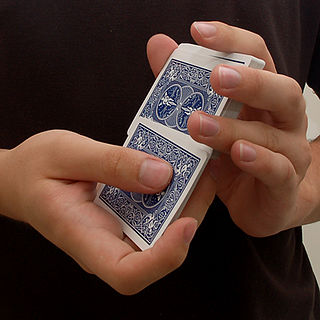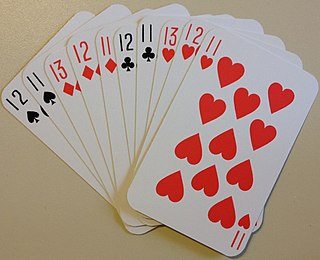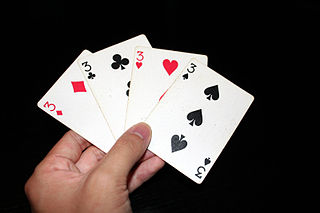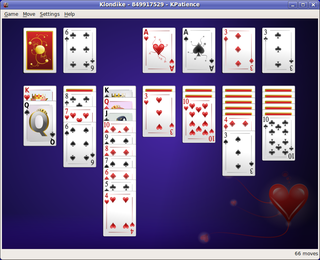
Shuffling is a procedure used to randomize a deck of playing cards to provide an element of chance in card games. Shuffling is often followed by a cut, to help ensure that the shuffler has not manipulated the outcome.

500 or five hundred, also called bid Euchre is a trick-taking game that is an extension of euchre with some ideas from bridge. For two to six players, it is most commonly played by four players in partnerships, but is sometimes recommended as a good three-player game. It arose in America before 1900 and was promoted by the United States Playing Card Company, which copyrighted and marketed the rules in 1904. 500 is a social card game and was highly popular in the United States until around 1920 when first auction bridge and then contract bridge drove it from favour. 500 continues to enjoy popularity in Ohio and Pennsylvania, where it has been taught through six generations community-wide, and in other countries: Australia, New Zealand, Canada (Quebec) and Shetland. The originator of Five Hundred, US Playing Card Company of Cincinnati, Ohio, now has headquarters across the Ohio River in Erlanger, Kentucky. Five hundred is promoted by some as the national card game of Australia.
Spite and Malice, also known as Cat and Mouse or Screw Your Neighbor, is a traditional card game for two or more players. It is a reworking of the late 19th century Continental game Crapette and is a form of competitive solitaire, with a number of variations that can be played with two or three regular decks of cards. It is descended from Russian Bank.

Golf is a card game where players try to earn the lowest number of points over the course of nine deals.

Rummy is a group of matching-card games notable for similar gameplay based on matching cards of the same rank or sequence and same suit. The basic goal in any form of rummy is to build melds which consist of sets, three or four of a kind of the same rank; or runs, three or more cards in sequence, of the same suit. If a player discards a card, making a run in the discard pile, it may not be taken up without taking all cards below the top one. The Mexican game of Conquian is considered by games scholar David Parlett to be ancestral to all rummy games, which itself is derived from a Chinese game called Khanhoo. The rummy principle of drawing and discarding with a view to melding appears in Chinese card games at least in the early 19th century, and perhaps as early as the 18th century.
Accordion is a solitaire game using one deck of playing cards. It is so named because it looks like accordion pleats, which have to be ironed out. Alternative names include Idle Year, Tower of Babel, and Methuselah.
Aces Up is a solitaire card game using a deck of 52 playing cards.
Decade or Ten-Twenty-Thirty is a Patience game played with a traditional 52-card deck. It is akin to another solitaire game called Accordion, but during game-play three adjacent cards totalling 10, 20, or 30 can be removed.
Cribbage solitaire is a solitaire card game using a deck of 52 playing cards. It is based on the game of five-card cribbage, also known as the "old game", and is one of many solitaire card games based on those played by at least two players, best known of which is poker solitaire.
Kings in the Corner, or King's Corners is a multi-player solitaire-style card game using one deck of standard playing cards with between two and four players participating.

Badugi is a draw poker variant similar to triple draw, with hand-values similar to lowball. The betting structure and overall play of the game is identical to a standard poker game using blinds, but, unlike traditional poker which involves a minimum of five cards, players' hands contain only four cards at any one time. During each of three drawing rounds, players can trade zero to four cards from their hands for new ones from the deck, in an attempt to form the best badugi hand and win the pot. Badugi is an often gambling game, with the object being to win money in the form of pots. The winner of the pot is the person with the best badugi hand at the conclusion of play. Badugi is played in cardrooms around the world, as well as online, in rooms such as PokerStars. Although it doesn't have its own tournament per se at the WSOP, it is featured in the Dealers Choice events as well as in the Triple Draw Mix.
3-5-8, also known as Sergeant Major for its popularity among members of the Royal Air Force, is a trick-taking card game for 3 players, using a standard 52 card deck. 3-5-8 may be played as a gambling game, or not, and there are many variations with names like "8-5-3" and "9-5-2" played throughout the world. The version "9-5-3 variation with no kitty" was played in the Royal Navy over fifty years ago, when fellow crew would sit around to continue their game from the previous night.
Royal Flush is a solitaire card game which is played with a deck of 52 playing cards. The game is so called because the aim of the game is to end up with a royal flush of any suit.

Four Color Cards is a game of the rummy family of card games, with a relatively long history in China. In Vietnam the equivalent game is known as Tứ sắc.

Continental Rummy is a progressive partnership Rummy card game related to Rumino. It is considered the forerunner of the whole family of rummy games using two packs of cards as one. Its name derives from the fact that it is played throughout the continental Europe, the United States, Mexico, Canada, and also in South America. According to Albert Morehead, it was "at one time the most popular form of Rummy in women's afternoon games, until in 1950 it lost out to Canasta."

Patience (Europe), card solitaire or just solitaire (US/Canada), is a genre of card games that can be played by a single player. Patience games can also be played in a head-to-head fashion with the winner selected by a scoring scheme.

Khanhoo or Kanhu is a non-partnership Chinese card game of the draw-and-discard structure. It was first recorded during the late Ming dynasty as a multi-trick taking game, a type of game that may be as old as T'ienkiu, revised in its rules and published in an authorized edition by Emperor Kao Tsung in 1130 AD for the information of his subjects. Meaning "watch the pot", it is very possibly the ancestor of all rummy games.
The following is a glossary of poker terms used in the card game of poker. It supplements the glossary of card game terms. Besides the terms listed here, there are thousands of common and uncommon poker slang terms. This is not intended to be a formal dictionary; precise usage details and multiple closely related senses are omitted here in favor of concise treatment of the basics.

Schnapsen or Schnapser is a trick-taking card game of the Bézique (Ace-Ten) family that is very popular in Bavaria and the territories of the former Austro-Hungarian Empire. Schnapsen is both of the point-trick and trick-and-draw subtypes.
Irish Switch, also called Two-four Jacks, Lives or Black Jack, is a version of the card game Switch popular in Ireland. It is very similar to the original with a few rule changes. Switch is a shedding-type card game for two or more players that is popular in the United Kingdom, and as alternative incarnations in other regions. The sole aim of switch is to discard all of the cards in one's hand; the first player to play the final held card, and ergo have no cards left, wins the game. Switch is very similar to the games Uno and Mau Mau, both belonging to the larger Crazy Eights family of shedding games.










